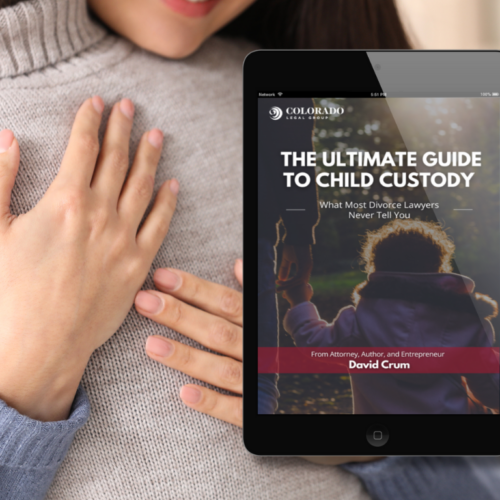We help clients determine the best way to reach a child custody agreement that is beneficial for the family. When our clients understand all of the options available, it increases the chances of them arranging a child custody agreement that best suits the needs of the children.

A Successful Child Custody Agreement Starts With the Best Interests of The Child
Free Case Evaluation
"*" indicates required fields
Getting Custody of Children in Colorado
In Colorado, custody of children consists of two parts: decision-making ability and parenting time. Decision-making is about determining which parent holds the right to make significant decisions affecting their children’s lives. Colorado courts generally favor joint decision-making, encouraging parents to collaborate on matters such as their children’s education, healthcare, and other significant life aspects. Joint decision-making arrangements require a collaborative effort between the parents.
However, joint decision-making is not suitable for all situations. Each custody case is evaluated individually, and depending on the specifics, a court may grant one parent sole decision-making rights. This decision is usually based on what serves the child’s best interests, taking into account various factors including each parent’s ability to make sound decisions and cooperate with the other parent.
Colorado Legal Group’s Denver child custody attorneys handle child custody cases with the goal of arranging child custody agreements that best suit the needs of the children. Simply, we help our clients create child custody agreements that are beneficial for the family. If the child custody issues become contentious, however, we are prepared to fight aggressively on our client’s behalf.
Overview of Colorado Visitation Rights
Navigating the complexities of visitation rights, also known as the allocation of parental responsibilities in Colorado, can be one of the most challenging aspects of a divorce, regardless of whether the marital dissolution is recent, or occurred some time ago. The issue of custody and visitation is not only legally intricate, but also emotionally taxing.
Having a dedicated Denver child custody attorney can be invaluable in addressing and resolving these difficulties effectively. Our experienced legal team is equipped to handle a variety of custody-related challenges. Whether you’re looking to modify an existing custody agreement due to changes in circumstances, or need assistance enforcing a court order where one parent is not complying with the agreed terms, we are here to provide support and legal expertise.
Our services extend to addressing more complex scenarios such as relocating with a child, negotiating visitation rights for grandparents or other relatives, and dealing with allegations of parental alienation or abuse that may affect visitation decisions. Our aim is to safeguard your rights, while ensuring that the best interests of your children are prioritized in every legal maneuver.
During such stressful times, the support of a competent Denver attorney can make a significant difference. We help navigate the legal system, advocate for your parental rights, and strive for a resolution that enhances your relationship with your child. Remember, effective legal support can transform a contentious situation into a manageable one, focusing on the well-being of all involved parties.
Modifying an Existing Custody Agreement
As children grow and circumstances such as lifestyles or living arrangements change, it may become necessary to revisit and modify existing child custody schedules. These adjustments are important to ensure that the arrangements continue to serve the best interests of the children involved. If you find that your current custody agreement no longer fits your family’s needs, it is advised to engage with skilled Denver attorneys who specialize in family law and custody modifications.
A child custody attorney can assess whether you have substantial grounds to request a modification of the custody agreement. These legal professionals are adept at navigating the complexities of family law to advocate for necessary changes. The courts prioritize the child’s best interest in any custody-related decision in Colorado. Factors that may justify a modification include:
- The Child’s Preference: As children mature, their preferences can be considered by the court, especially if they express a desire to alter their living arrangements.
- Changes in Residency or Employment: If one parent relocates or undergoes significant changes in their job situation, it may necessitate a revision of the custody schedule to accommodate new logistics.
- Family Dynamics: The addition of new family members, such as a new sibling or a stepparent, can impact the child’s living environment and require adjustments to the custody plan.
- Integration into the Other Parent’s Home: If the child spends more time at one parent’s home by mutual consent, this might lead to a formal change in the custody arrangement to better reflect the actual living situation.
- Legal or Safety Concerns: If a parent commits a crime or engages in behavior that endangers the child, this is a significant reason to reconsider custody terms.
- Health Concerns: Serious health issues affecting either the child or a parent can necessitate modifications to custody to ensure that the child’s needs are adequately met.
Type of Custody: Joint Custody Vs. Sole Custody
In Denver, family dynamics are diverse, and the courts recognize that a one-size-fits-all custody arrangement does not exist. Custody is typically divided into two main categories: physical custody, which determines where the child resides and spends the majority of their time, and decision-making custody, both of which can be either joint or sole. While courts generally prefer joint decision-making to encourage both parents to participate actively in important decisions affecting their child’s life, sole decision-making may be granted in extenuating circumstances where it serves the child’s best interests. When determining the appropriate division of custody, several critical factors are considered to ensure that the outcome aligns with the child’s best interests. These factors include:
- Children’s Desires: What the children prefer if they are old enough to express reasoned and independent wishes.
- Parental Desires: Each parent’s preferences and their reasons behind them.
- Child’s Relationships: The quality of the child’s relationships with each parent and other influential figures.
- Adjustment: How well the child is adjusting to their home, school, and community environments.
- Health of All Parties: The mental and physical health of the children and parents involved.
Sole Physical Custody
Sole physical custody is an arrangement where only one parent has the right to have the child live with them the majority of the time and the other parent has dedicated visitation time or specific days they spend with the child. For example, a sole physical custody arrangement could look something like this: the child permanently resides with the parent that has sole physical custody, but every other weekend the child stays with the other parent. It is important to understand that sole physical custody doesn’t mean the non-custodial parent will not see their child, it simply refers to where the child resides the majority of the time. Courts favor visitation time to ensure the child has a strong relationship with each parent. However, there are extenuating circumstances where this is not favorable for the child, such as instances of domestic violence. This decision is often influenced by factors such as the stability of the home environment, the safety of the child, and the overall capability of one parent to meet the child’s day-to-day needs.
Joint Physical Custody
Joint physical custody is an arrangement where a child spends significant time living with each parent. This type of custody is designed to ensure that the child maintains a strong relationship with both parents, despite the separation or divorce. It reflects a collaborative approach to parenting, where both parents share the responsibilities and privileges of raising their child.
How Legal Custody is Determined in Colorado
In both joint physical custody and sole physical custody arrangements, it is important to note that decision-making rights, also known as legal custody, can still be shared between both parents. Regardless of which parent the child primarily lives within the case of sole physical custody, or whether the child splits their time equally between both parents in joint physical custody, both parents can retain the right to make key decisions about their child’s life. This includes choices related to education, health care, religious upbringing, and other significant aspects of a child’s welfare. An experienced Denver child custody lawyer can provide invaluable assistance for these complex arrangements, ensuring that the custody agreement reflects both the best interests of the child and the rights of the parents.
Engaging with experienced attorneys can help when navigating these decisions by:
- Providing legal advice tailored to your unique family situation.
- Ensuring that all decisions made are in the best interests of the child.
- Advocating for a custody arrangement that fosters a safe and loving environment for the child.
Our Denver attorneys are instrumental in guiding parents through the legal intricacies of establishing an appropriate custody arrangement, focusing always on the well-being and preferences of the child involved.
Child Custody Arrangements You Should Get Familiar With
When working with an experienced custody attorney, you’ll begin to better understand Colorado divorce and child custody laws, along with some of these various key terms that will be used:
- Sole custody
- Joint legal custody
- Physical custody
- Custodial parents
- Non-custodial parents
- Allocation of Parental Responsibilities (APR)
- And so much more…
Child Abandonment by a Parent
When a parent abandons their child or is found guilty of gross misconduct, the court may respond by adjusting the custody arrangements to protect the child’s best interests. In such cases, the judge might grant sole decision-making authority to the other parent. This ensures that the responsible parent can make important decisions about the child’s welfare without the absentee parent’s influence, which might jeopardize the child’s well-being.
Despite these circumstances, in many family situations where both parents are capable and responsible, a 50/50 custody agreement is generally preferred. This arrangement allows children to spend equal time living with each parent, fostering a relationship with both. However, while theoretically ideal, implementing a 50/50 custody plan can be challenging, and doesn’t work for every family. Coordinating between different households can complicate the child’s school and extracurricular schedules, potentially leading to conflicts and stress for both the parents and, more importantly, the children. A Denver child custody attorney could help you negotiate a child custody agreement that will work best for all parties involved.
Risks of Managing Child Custody Battles Without an Attorney
Handling a child custody case on your own can carry significant risks that might not only jeopardize your legal rights but can also have long-lasting effects on your relationship with your child. Here are some of the risks involved:
- Legal Mistakes: Custody proceedings are complex and governed by a multitude of rules and regulations. Without legal expertise and guidance, you are more likely to make procedural errors or misinterpret legal standards, which could detrimentally affect the outcome of your case. Missteps like improperly filed paperwork or missed deadlines can delay the process and negatively impact your case.
- Risk of Losing Custody: In the absence of professional legal representation, you might struggle to effectively present your case, leading to less favorable outcomes. This could mean losing primary custody or receiving limited visitation rights, significantly affecting your ability to maintain a close relationship with your child.
- Long-Term Effects: The decisions made during a custody battle can have enduring impacts on both your life and that of your child. We can help ensure that the custody agreement is equitable and supports the best interests of your child, including their emotional and developmental needs. Additionally, they can help you in the future if any changes ever need to be made to your agreement.
- Negotiation Disadvantages: Without a lawyer, you may also be at a significant disadvantage during the negotiation phases. Lawyers are skilled in negotiation, and can advocate for your parental rights while also considering fair compromises. They can handle complex discussions, such as those involving relocation, changes in custody due to new circumstances, or modifications based on your child’s evolving needs.
- Emotional Strain: Attempting to manage a custody battle without legal help can be emotionally overwhelming. A lawyer can serve as a buffer between you and stressful interactions, allowing you to focus more on supporting your child through the process rather than getting bogged down by legal details and disputes.
While it might be tempting to handle a custody case independently to save costs or for other reasons, the risks involved can lead to significant disadvantages.
Hiring a Denver Child Custody Attorney
We understand the emotional toll a custody battle can take on you and your family, and we’re truly sorry that you’re facing such challenges. It’s important to have knowledgeable support during this trying time, and that’s where our experienced Denver child custody attorneys can help. With offices located in Denver, Grand Junction, and Colorado Springs, we are well-positioned to provide legal assistance throughout the state, no matter where you’re located. If you feel overwhelmed by the complexities of your case or if you’re struggling to navigate the legal system alone, please consider setting up a consultation with one of our experienced child custody attorneys.
Fill out a free case evaluation or call us at 720-594-7360 to get started.
Free Case Evaluation
"*" indicates required fields

The Best Interests of the Child
How The Courts Decide Custody
The standard by which the court will determine child custody is what is in “the best interests of the child.” In order to minimize the trauma of divorce and an unhealthy custody arrangement, the parties should always remain focused on this standard, taking into account such things as the age of the children, their emotional well-being, and their present and former relationships with each parent.
How Much Time You’ll Have With Your Child
Parenting Time and Visitation
Parenting time, on the other hand, is where the children physically reside during the week/weekend, during summers and other major holidays. Parents can share equal parenting time or make alternate agreements. If the children are with one parent for a majority of the time, that parent is typically referred to as the “primary custodian,” or “primary parent.” If the parents cannot agree on parenting time, a judge will examine a set of factors related to the best interests of the children and determine parenting time accordingly.
What's the Difference?
Reasonable Visitation and Fixed Visitation
In a Colorado custody order, the judge will express who has physical and legal custody of the couple’s minor children and the visitation rights of each parent. This part of the order will include the days and times that each parent will spend with the children. It is crucial to understand that even if a judge does not give physical or legal custody to one parent, that parent still has visitation rights under Colorado laws as detailed in Colorado Revised Statutes §14-10-123-132.
Reasonable visitation allows the parents to determine an appropriate visitation schedule. The definition of reasonable is different in each state and for each couple. In a reasonable visitation order, the parents will have the freedom to choose what works best for them. The downfall to a reasonable visitation order is that it is generally unpredictable, difficult to enforce, and can be inconvenient for some parents.
On the other hand, a fixed visitation schedule is more common. With this type of schedule, the order is extremely detailed as far as; Where the child will live, Who the child will be with on specific days and times, Where the child will spend their birthdays, holidays, school breaks, and/or summer vacations, and The location where the parents will exchange the child.
For some parents, this type of detailed fixed visitation schedule works best as it leaves little room for interpretation or arguments. Each parent knows exactly who the child will be with on any given day and can plan their schedules accordingly.

The Ultimate Guide to Child Custody
The Ultimate Guide to Child Custody
"*" indicates required fields

Need Help with Child Custody?
Call Colorado Legal Group at 720.594.7360 or get started with a complimentary case evaluation.
Free Case Evaluation
"*" indicates required fields
Frequently Asked Questions From our Denver Child Custody Lawyers
Are child custody records public?
As a general rule, documents filed in a divorce case are a matter of public record. In other words, unless a case is sealed, anyone can go to the courthouse and get a copy of any pleading filed in any case. While these are not custody “records,” the parties’ custody agreement and parenting plan are public records. Divorce cases are rarely, if ever, sealed by the court.
Can child custody cases be appealed?
Child custody can be appealed in certain instances but more often clients are better suited asking to modify existing orders to suit the changing needs of a family. A parenting plan that is in the best interests of very young children (2 and 3) often needs to be revised as the children get older and circumstances change.
How long do child custody cases take?
The length of a child custody case depends on several different factors. The more parties can agree on the best interests of the children, the faster cases conclude. A contentious custody case tends to take longer as often parties must wait on expert reports and the court’s calendar to fit the case in.
What is the legal standard the court uses to make a custody award?
The courts in Colorado use the “best interests of the child” standard in determining custody arrangements for divorcing parties.
Should I talk to my child about who she/he wants to live with?
Our firm believes that a child should never be put in the position of choosing one parent over the other. This can have lasting, negative effects on children. Instead, we believe that working with the parents, staying focused on the best interests of the children, and sometimes using third party neutrals, is a far better way to resolve custody disputes.
What is a Parental Responsibilities Evaluator?
A parental responsibilities evaluation (PRE) is an evaluation conducted by an expert, which can involve psychological testing of the parties, third party collateral interviews, child-parent observations, interviews with the parties, and other techniques that allow the expert to make a custody recommendation to the court. These types of evaluations are not the norm, and are typically only used when the parties cannot make any real progress toward resolving their custody issues and there are significant issues at play, such as serious mental illness and/or substance abuse. A less invasive and less expensive alternative is using a Child and Family Investigator to examine the case and make a recommendation to the court.
How Can We Help?
Denver Office (Main):
1777 S Harrison St. #1050
Denver, CO 80210
720.594.7360
Colorado Springs Office:
102 S Tejon St. #510
Colorado Springs, CO 80903
719.715.2850
Grand Junction Office:
120 W Park Dr. #205
Grand Junction, CO 81505
970.712.1152
Email:
info@coloradolegalgroup.com
Tell Us Your Story
"*" indicates required fields
